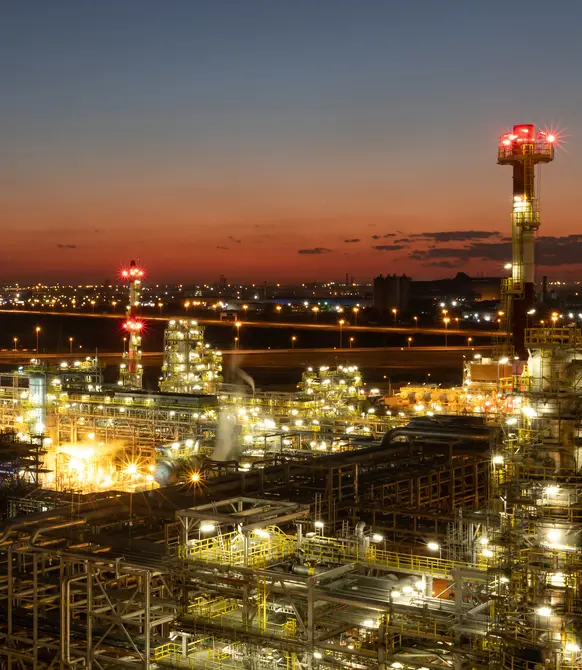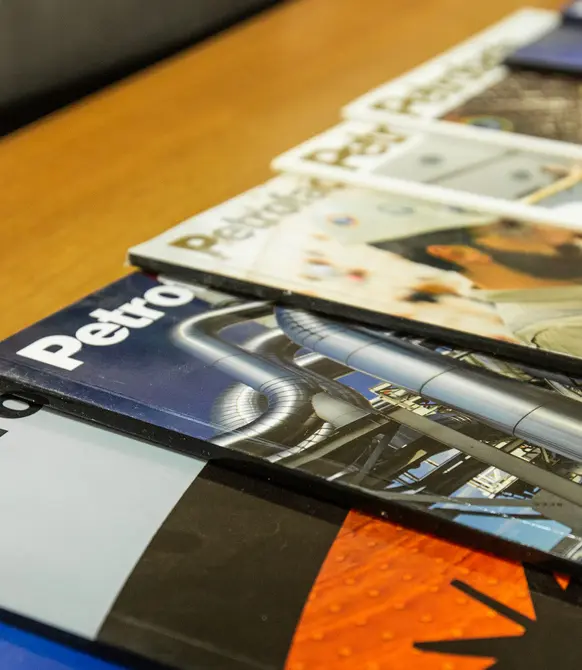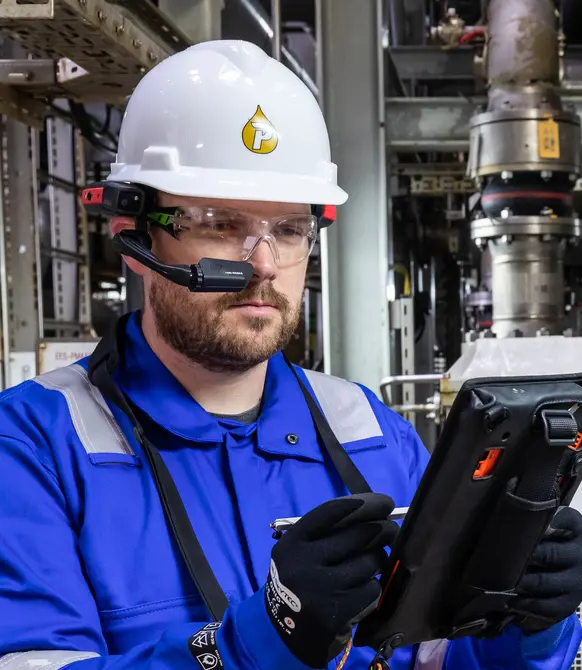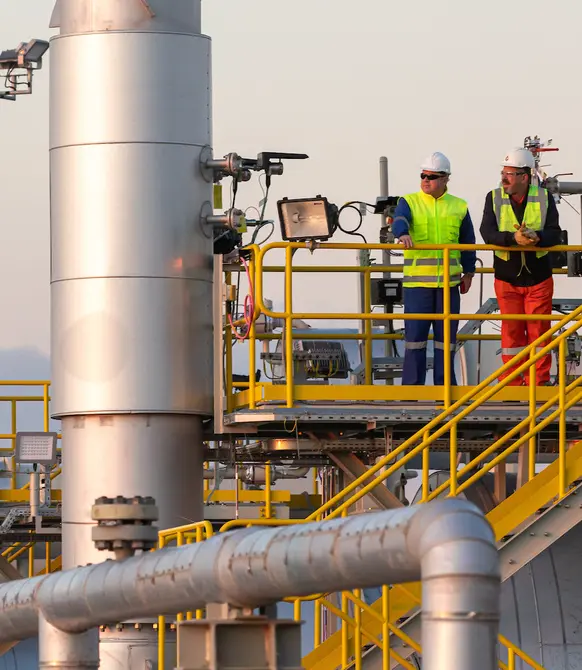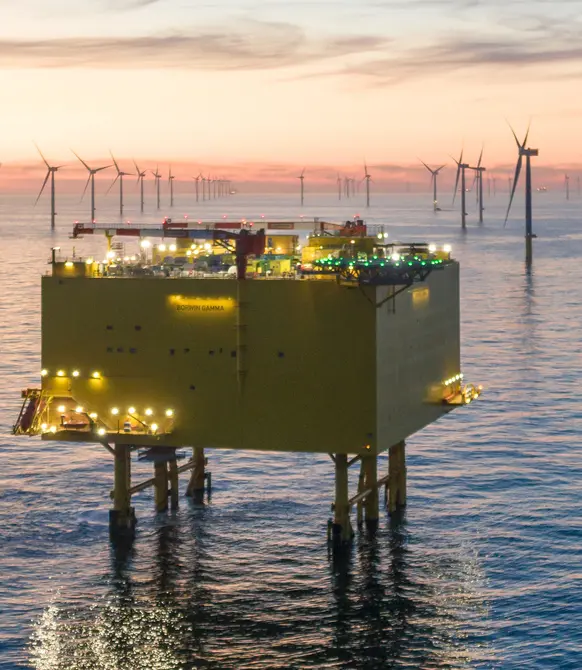24 April 2014
The Island Warriors
They’re the team conquering the challenges involved in constructing a project on a group of artificial offshore islands.
Lynn Hobballah, an HSE specialist at Petrofac, will always remember when she heard the news that the company had won the contract for the Upper Zakum, UZ750 field development in Abu Dhabi. “We started hearing rumours,” she says. “Then I was called into my manager’s office and he told me the rumours were true. We had won. I was so happy. It meant that the offshore training I had in Aberdeen could finally be put into use.”
The contract is worth approximately US$3.7 billion – and is particularly challenging, for it is being constructed on four artificial islands, 80km off the Abu Dhabi coastline.
Yousseff AlJalam, a procurement engineer, had been working on the proposal for more than a year, analysing how best to procure US$1 billion worth of equipment.
On hearing the official confirmation that Petrofac had won the contract, Yousseff was delighted. “It felt great,” he says. “You knew then that you would be based in Abu Dhabi and you knew what you would be doing for at least a couple of years. But then the realisation set in that there was a lot of work to do.”
Johnson John, a manager of process engineering, was among more than 30 people from the Sharjah office working on the deal, with help from engineers in Chennai. “Since I was involved in the proposal for more than a year, I knew how massive the project was going to be,” he explains.
As soon as the announcement was made official there was suddenly the need for more office space in Abu Dhabi. Fortunately this had been reserved at the Abu Dhabi Business Hub in Mussafah, but two new floors had to be fitted out. Shortly afterwards, more than 300 engineers arrived from Chennai, and they all needed accommodation.
“It was a little scary getting into such a big project,” says Johnson. “The requirements are top of the class and we need a very big team.”
Within days of the contract award being announced, teams within Petrofac were being assembled. David Knight, a logistics officer, quickly realised that one of the keys to success was getting everyone in Petrofac to appreciate the importance of logistics.
“There are no second chances with offshore projects,” he says. “If you get it wrong or a vessel breaks down it is particularly tricky and can lead to long delays.”
There are other factors to bear in mind. For an offshore site you need people logistics. “People need to have the right certificates to go offshore,” says David. “You cannot just whistle up another welder, they need the certificates that can take three to four months to get. Very quickly we needed to work out what the deliverables were.”
Another factor that makes this project particularly challenging is that, in response to the constraints of the artificial islands, it is being constructed in a modular fashion. Some of the modules will weigh more than 3,000 tonnes. They are being constructed locally in the UAE as well as in Korea, Singapore and China, before being shipped to the artificial islands.
“Every project has some modular element,” says Chris Joyce, project controls manager fabrication and construction. “But in this project it is even more important.
“For something of this size you would normally need about 10,000 to 12,000 people on site. But that isn’t possible. So you need to build everything twice, once in the yard and once again on the islands. And it doesn’t help that every facility has what is essentially a big moat around it. Storage is at a premium.”
Rami Mohammad, a member of the constructability team, agrees. “The challenges are similar to those we faced in El Merk in Algeria. This project is also very isolated, but this time surrounded by water rather than sand. So we have to plan everything in advance because of the space limitations.
“Where do we put the batching plant? When do we transport the materials? All this has required a tremendous amount of planning and cooperation with the other contractors. It is all about mitigating risk.”
Within the first few weeks, strategy workshops were taking place in Sharjah and Abu Dhabi. Offshore training courses were being run. And subcontractors were being contacted.
“There will be many subcontractors,” says Michel Moufarrej, a subcontracts manager. “We need to bring everything to these islands – water, electricity, cleaning facilities, food, accommodation. We even need to have air-conditioning units for the waste because otherwise it will smell terrible in the summer.”
Sung Sang Hyeob, nicknamed “The Shark” because of his offshore experience and love of the sea, is a planning engineer at Daewoo Shipbuilding & Marine Engineering (DSME).
He arrived in Abu Dhabi in September from Houston, Texas. He is in charge of finalising a schedule for the construction, an important component of the project because of its modular nature. “Our company only does offshore work,” he says. “So it has been great to get to know Petrofac. I am learning something new every day.”
Subramanian Sarma, Managing Director of Petrofac’s Onshore Engineering & Construction (OEC) business, says he is delighted that Petrofac has been selected to deliver this landmark project for the Upper Zakum development in Abu Dhabi. “Through Petrofac Emirates we continue to show our commitment to supporting the oil and gas industry in Abu Dhabi and this project builds on the substantial work we have underway in the UAE,” he says.
“We look forward to developing our relationship with ZADCO through the successful delivery of this strategically important project.”
As well as all the technical, logistical and training challenges, Petrofac procurement staff are having to deal with rather more unusual requests than normal. “Last week we had to buy 96 fridges for one of the camps on the islands,” says Yousseff. “I’ve never had to do thatbefore.”
Article written by Rupert Wright. Photographs by Daryl Visscher. Source: Petrofacts 2014.


